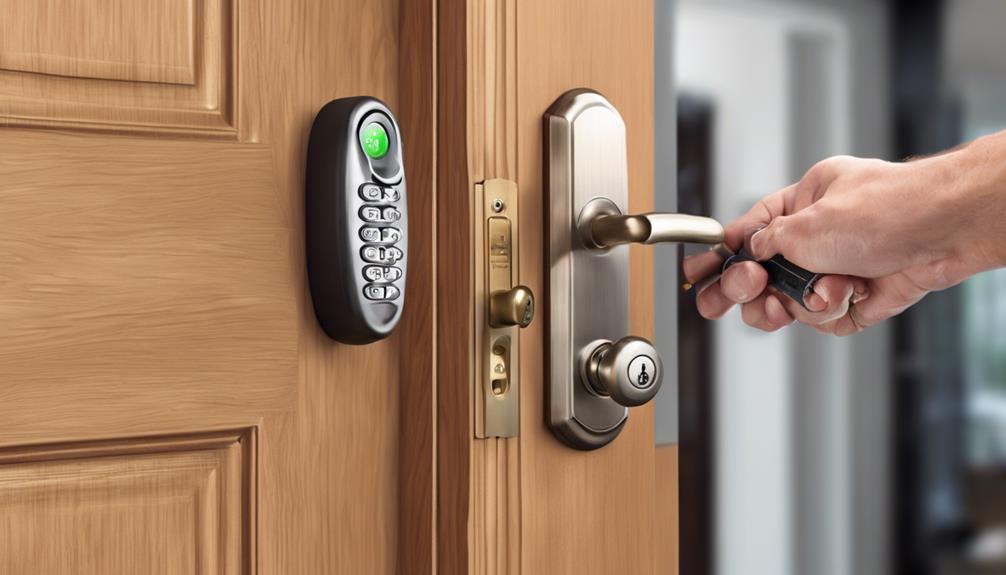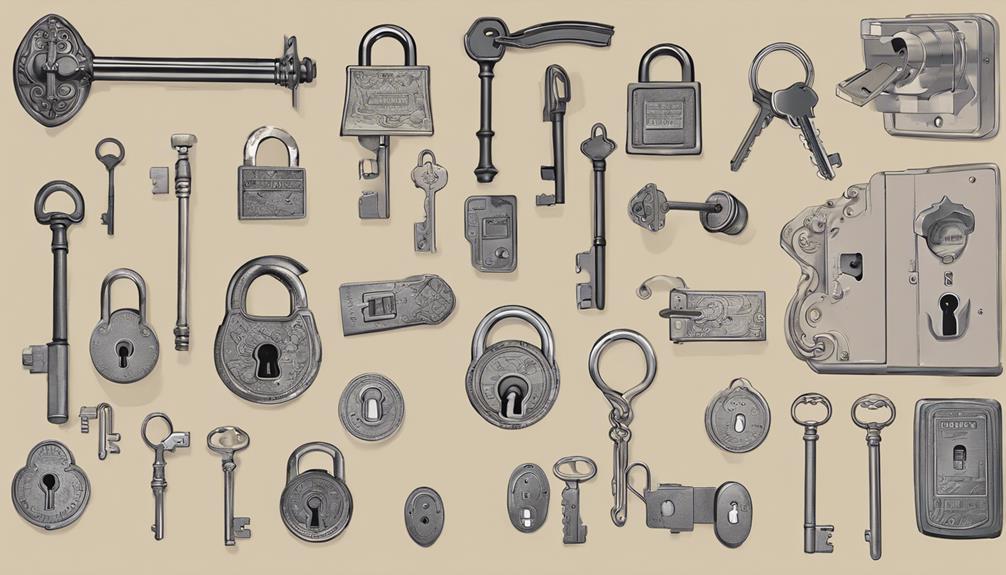Yes, locksmiths generally work on all types of locks, whether you’ve got a traditional deadbolt or a high-tech smart lock. They’re equipped to handle both residential and commercial locks, offering services like key cutting, re-keying, and more. For vehicle owners, automotive locksmiths provide specialized services, including damage-free entry and security programming. However, certain specialty locks, like vaults or advanced smart locks, might require specific skills or tools, so it’s crucial to check if the locksmith you’re considering has the necessary expertise in those areas. Knowing more about these professional services could greatly benefit your security planning.
Overview of Locksmith Capabilities

Locksmiths offer diverse services, but it’s important to check if they can handle your specific lock type, such as safes, smart locks, or vintage models. Not all locksmiths are jacks-of-all-trades in the lock arena. I mean, decoding a smart lock isn’t quite the same picnic as picking your basic deadbolt. These modern marvels might require a locksmith who’s also a part-time hacker. And those charming vintage locks? They might need someone who’s part historian, part locksmith. As for safes, you’re looking at needing a veritable lock-picking Houdini with a flair for cracking codes under pressure. So, always ask about your locksmith’s capabilities to avoid turning your lockout situation into a comedy of errors!
Residential and Commercial Locks

While considering a locksmith’s capabilities, it’s also important to understand the distinctions between residential and commercial locks they may work with. Professional locksmiths are trained to work on the various door locks that a locksmith encounters, whether they’re safeguarding your cozy nook or your corporate castle.
| Type | Residential | Commercial |
|---|---|---|
| Lock Systems | Cylinder, Lever Locks | Keyless Systems |
| Services | Key cutting, Re-keying | Safety Compliance |
| Security Focus | Home Security | Securing Assets |
| Example Locations | Homes, Apartments | Offices, Warehouses |
Different types of locksmiths cater to either residential and commercial needs, ensuring that whether it’s your family jewels or company treasures, they’re locked up tighter than a drum!
Automotive Lock Services

If you’re locked out of your car, automotive locksmiths provide swift and specialized services to get you back on the road quickly. These wizards of the lock world have a knack for handling your car lock systems without turning your door into a modern art piece. Thanks to their programming expertise, they’re always in tune with changing trends in vehicle security, ensuring they can handle the latest and greatest tech your ride sports. With a range of services that include everything but making you a coffee while you wait, these pros deliver damage-free solutions, keeping your car’s aesthetics unharmed. So next time you’re locked out, don’t sweat it—your automotive locksmith is just a call away!
Specialty Locks and Challenges

Exploring the world of specialty locks presents unique challenges that require advanced skills and specialized knowledge. When you’re faced with a lock featuring advanced features like fingerprint scanners or retina displays, don’t expect your average Joe (or Jane) locksmith to just waltz in and whip out a set of old trusty picks. Nope, these smart locks demand a tech-savvy touch, integrating more wires and software than your teenage cousin’s gaming setup.
Vaults? They’re no walk in the park either. With their advanced technology, cracking them open legally requires specific tools, heaps of training, and the right authorization. So, unless you’ve got all three, you might find yourself locked out of more than just your car or house!
Contacting Low Rate Locksmith

When you need a locksmith, contacting Low Rate Locksmith is your best bet for reliable and efficient service. Whether you’re locked out of your car at midnight or your office door refuses to budge on a Monday morning, their emergency locksmith services are here for you 24/7. These pros are not just locksmiths; they’re magicians able to open every kind of lock imaginable! Need a digital fortress cracked or a humble cabinet opened? No problem! From key cutting to re-keying, Low Rate Locksmith’s locksmith services cover it all. So, don’t hesitate to contact us—whether it’s a simple fix or high-tech hiccup, these trained professionals have your back.
Frequently Asked Questions
What Are the Typical Costs for Emergency Locksmith Services?
The typical costs for emergency locksmith services usually range between $75 and $250. These costs can increase during nights, weekends, or holidays due to higher demand. You’ll also face additional fees like service call charges or costs for parts and labor. Always ask for a written estimate before work begins to avoid any unexpected charges. Prices may vary based on your location and the complexity of the job needed.
How Long Does a Standard Lock Repair Take?
Imagine this: you’re in a race against the clock, but luckily, most basic repairs, like tightening a wobbly doorknob or rekeying, zip by in just 15 minutes to an hour. However, if your lock’s guts need a makeover or it’s seen better days structurally, it might stretch out a bit longer. Factors like lock type and damage depth play big roles here.
Can Locksmiths Duplicate “Do Not Duplicate” Keys?
Yes, locksmiths can duplicate “Do Not Duplicate” keys, but it’s not just a free-for-all. They’ll usually need a good reason, like authorization or proof that you’re the rightful owner. Plus, not all keys are fair game; some are restricted by patents or manufacturer policies. If you’re unsure, it’s best to ask your locksmith directly. They can tell you whether they can help you out based on the type of key and their own policies.
Are Locksmiths Able to Install Digital Security Systems?
Yes, you can definitely get a locksmith to install digital security systems. These tech-savvy professionals not only work with traditional locks but have also expanded their skills to include digital systems. They’re equipped with the necessary IT knowledge and tools to handle sophisticated security technologies. So, if you’re thinking about upgrading to a digital lock, a qualified locksmith can certainly help you secure your home or office with the latest tech.
What Qualifications Should a Reputable Locksmith Have?
When you’re searching for a high-quality locksmith, make sure they’re licensed and certified. It’s vital; this guarantees they’re legitimate and skilled. They should also carry insurance—better safe than sorry, right? Experience matters too, especially with different types of locks. And don’t overlook checking their reputation; positive reviews are golden. Lastly, they should be up-to-date with the latest lock-picking tech. You want someone who stays sharp in their field!









